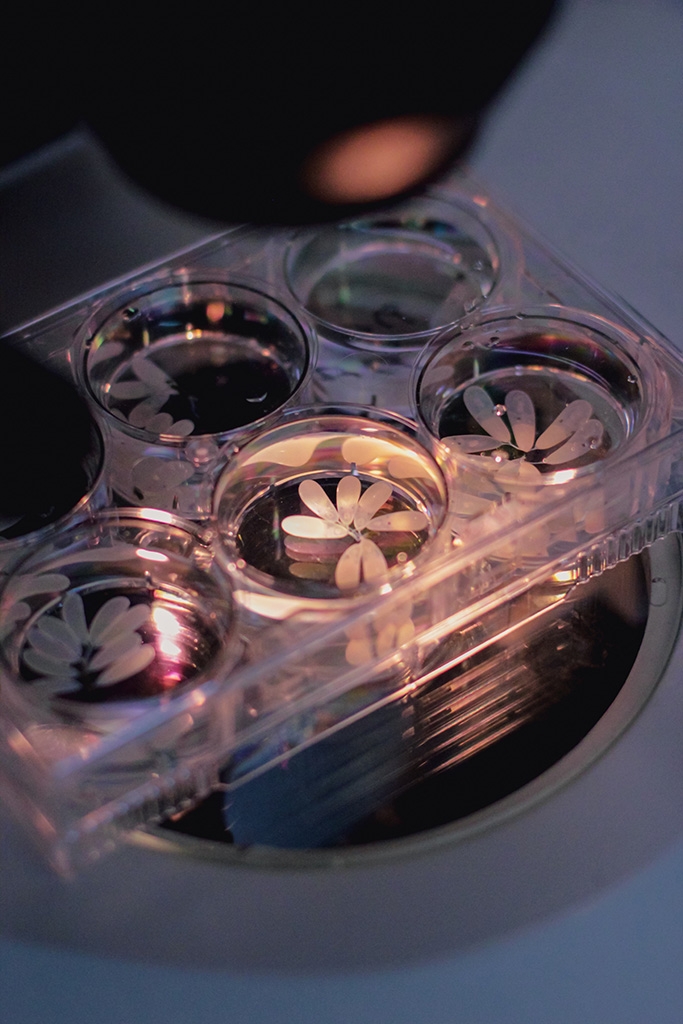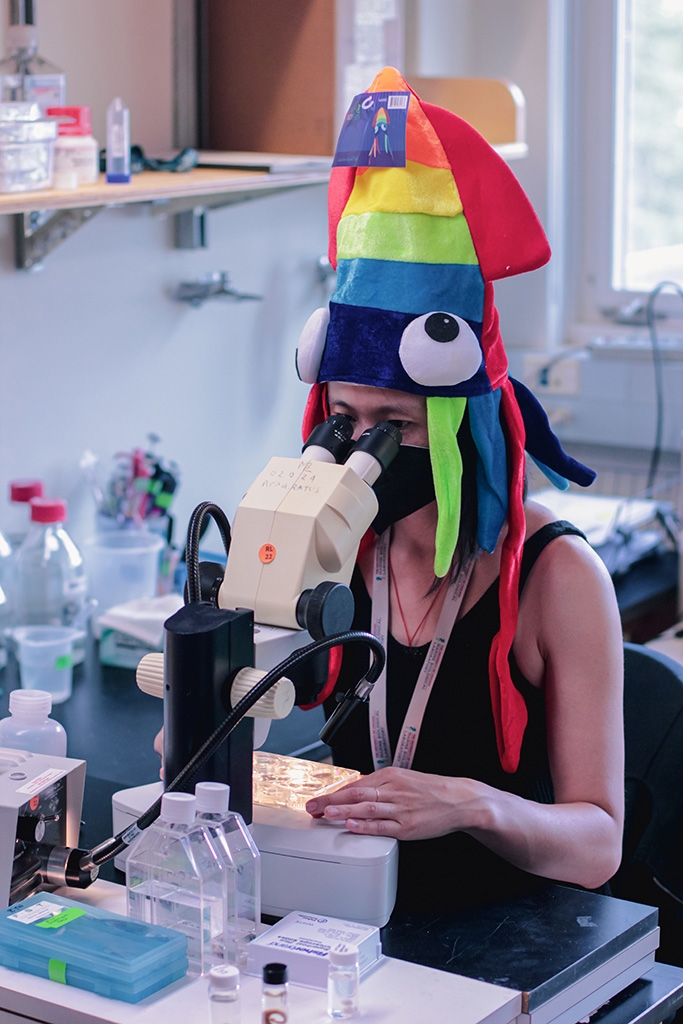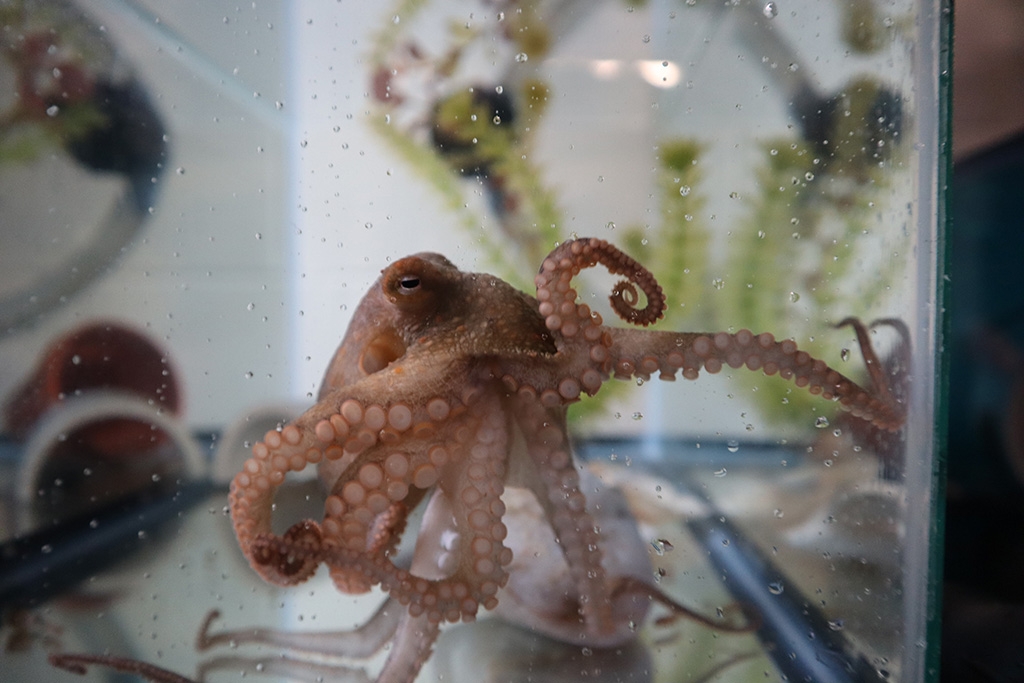Live Fast, Die Young: Grass Fellow Explores Octopus's Death Spiral

Unlike dolphins, humans, and other animals with a large brain relative to body size, most octopuses die after the first time they reproduce. After mating, octopus mothers guard their eggs, but in the process of doing so they stop eating and quickly deteriorate. Sometimes this process even involves purposefully damaging and eating their own arms.
Previous research has shown that this “death spiral” is controlled by the octopus optic gland, an organ similar to the pituitary gland in mammals. The optic gland acts as the main messenger between the central nervous system and the rest of the body. When it’s removed, the acute post-maternal decline disappears, and the octopus lives 4 to 6 months longer.
Much remains unknown about how the optic gland changes in order to induce a death spiral. Z. Yan Wang, incoming assistant professor of psychology and biology at University of Washington, Seattle, is investigating this mysterious process as a 2022 Grass Fellow at MBL. Wang is interested in the different cell types within the optic gland and how their spatial organization changes after mating.


As a PhD student with Professor Cliff Ragsdale at the University of Chicago, Wang was able to dissect many parts of the story of how the optic gland controls this death process. She laid the foundation for understanding the molecular identities of the optic gland, but, as with many scientific endeavors, the more she understood, the more questions presented themselves. After identifying some of the important signaling factors (hormones) in the process, she wondered if the organization of the cells in the optic gland that produce these signaling factors might have an analogy in the pituitary gland.
One defining feature of the vertebrate pituitary gland is that distinct cell groups make distinct hormones. If octopus optic glands are also organized in this way, “that would indicate that there's a really elegant conservation of a certain type of [cellular] organization,” says Wang. “And if we didn't find that, that would also be a super surprising fact – that the octopus is doing this totally differently.” Specifically, she wants to understand whether peptide- and steroid-hormones are produced by the same cells or distinct cells.

As a second goal of her research this summer, Wang hopes to study species of cephalopods–a group including octopus, squid, and cuttlefish–that mate and reproduce more than once before they die. By comparing optic glands of these squids to octopuses with only one mating cycle, she will be able to better understand the origins of their different reproductive behaviors.
In the future, she plans to study the neuroendocrine systems of one of the few species of octopus that mate multiple times, Octopus chierchiae, and compare their optic glands to those of single-mating octopuses. Wang was excited to do this work at MBL because in 2019, the lab’s Cephalopod Mariculture team became the first in the world to breed multiple generations of O. chierchiae. Since these octopuses are small and breed more than once, they have proven to be a great candidate for research.
“When I learned about the Grass Fellowship, I jumped on it because it was the coalescing of so many perfect factors. The chierchiae husbandry is really up and running, there are so many experts here, and the cephalopod facilities are incredible,” Wang says. “I feel absolutely spoiled!”
You can listen to Wang as a guest on Science Friday along with MBL Hibbitt Fellow Carrie Albertin.
To find out more about octopus death, check out the following articles:
Wells, M. J., & Wells, J. (1969). Pituitary Analogue in the Octopus. Nature, 222(5190), 293–294. https://doi.org/10.1038/222293a0
Wodinsky, J. (1977). Hormonal inhibition of feeding and death in octopus: Control by optic gland secretion. Science (New York, N.Y.), 198(4320), 948–951. https://doi.org/10.1126/science.198.4320.948
Wang, Z. Y., & Ragsdale, C. W. (2018). Multiple optic gland signaling pathways implicated in octopus maternal behaviors and death. Journal of Experimental Biology, 221(19), jeb185751. https://doi.org/10.1242/jeb.185751
Wang, Z. Y., Pergande, M. R., Ragsdale, C. W., & Cologna, S. M. (2022). Steroid hormones of the octopus self-destruct system. Current Biology, 32(11), 2572-2579.e4. https://doi.org/10.1016/j.cub.2022.04.043